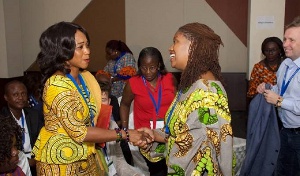 Barbara Asher Ayisi, Deputy Minister for Pre-Tertiary Education
Barbara Asher Ayisi, Deputy Minister for Pre-Tertiary Education
Barbara Asher Ayisi, Deputy Minister for Pre-Tertiary Education, has said technology has the potential to transform education by extending the learning space beyond the concrete walls of a classroom.
“Although our schools will continue to play a leading role in education, technology offers a variety of learning opportunities beyond the physical limits of school. With technology, we can revolutionise the reading culture in this country through increased access to reading materials.”
Mrs. Ayisi said this at the official opening of the 4th West Africa Digital Reading Summit in Accra which brought more than 200 experts from academia, educators, publishers in the country and six other countries.
The two-day summit being convened by Worldreader, a nongovernmental organization, with headquarters in San Francisco that has pioneered the field of digital reading with library of over 40,000 free digital books delivered to schools and libraries via e-readers and via free mobile phone apps.
The summit, which brought together 90 educators and educational administrators, 25 African publishers and partner organisations working to expand access to digital reading, is under the theme: ‘The Power of Digital in Learning: How Communities are Harnessing Mobile Technology and Digital Reading to Promote Continues Learning.’
Worldreader has programmes in 61 schools and seven community libraries in the country and has impacted the lives of over 17,400 active readers by providing 6,849 devices delivering over 1 million books. In addition, Worldreader works with more than 25 local publishers.
Worldreader provides free access to books in 43 languages to readers across the region through the Worldreader Android app and through a mobile site.
In December 2016, more than 20,000 Ghanaian young adults, parents and teachers actively read books on Worldreader Mobile.
Mrs. Ayisi indicated that the use of basic technology like mobile phones and e-readers can ensure access to relevant content all over the country.
“We need to embrace new ways of improving the educational system and adapt them to our local conditions. That is another reason why I am excited about Worldreader, because they are considering our local conditions and working with local publishers and authors to make sure the content they put on the devices includes books African people all over the continent can relate too. This kind of thinking is very important.
“Digital books can be cheap to distribute and with combined efforts from the government, NGOs and the private sector we can help make exciting things happen,” she said, adding that stakeholders must work towards access to digital books for everyone regardless of their circumstances or background.
She expressed government’s commitment to developing 60 digital libraries throughout the country, out of which 50 would be housed in physical structures whilst the remaining ten will be mobile libraries adding that the project is in line with government’s commitment to promote reading and literary skills particularly among children.
The technology involved in digital libraries will further enhance the realization of these objectives, the she said. This is just one of a number of steps this government is undertaking to embrace innovation and creativity to improve educational outcomes.
She explained that the role of a teacher is not merely limited to standing in front of a classroom and speaking to students rather an effective teacher understands that teaching involves playing multiple roles to ensure that the school day runs smoothly and all students receive quality education.
“I believe it is a role that does not get enough recognition and appreciation in our society and this must change. Teacher capacity and support as well as teacher training are issues we must continue to address. In general, improving teacher pedagogy alongside teaching resources is paramount to any work being done in our school system to improve reading,” she said.
She said: “To address the issue of quality in our schools, the education sector will require substantial investment and government alone cannot bear the burden. We must rely on a consortium of partners from the private sector, our development partners and even civil society to contribute to the discourse on providing quality education.
“In today’s fast moving global economy, a well-educated workforce that can leverage technology to help both the public and private sector operate more effectively and efficiently is key to being competitive.”
Mrs. Ayisi indicated that technology is an important variable that can make all this possible and Africa is now embracing this fact, adding that the basic technology like mobile phones and e-readers can ensure access to relevant content all over the country.
In the classroom, technology can be a powerful catalyst for pedagogical change, as students use technology to take a more active role in personalizing their own education, and teachers take on new roles as knowledge facilitators rather than knowledge transmitters.
Mr. Colin McElwee, WorldReader Co-Founder, said literacy was transformative as it increases earning potential, decreases inequality, improves health outcomes and breaks the cycle of poverty.
“The innovators in this room represent a new hope for expanding literacy in Ghana and beyond,” he said.
Mr. Julien Burns, Interim Director Communications, Worldreader, said by bringing together educators, publishers, government officials and cultural infleuncers, Worldreader hopes to build a digital reading movement that will give more children and families the opportunity to become readers.
He expressed the hope that at the end of the two days of exchanging of ideas and building partnerships, participants would return to their schools and organisation with a new set of tools to impact positively on the outcomes.
- See more at: http://thebftonline.com/business/education/24048/technology-has-the-potential-to-transform-education.html#sthash.4xr5i0gK.dpuf